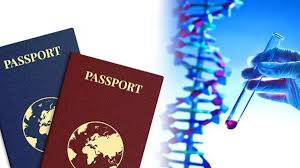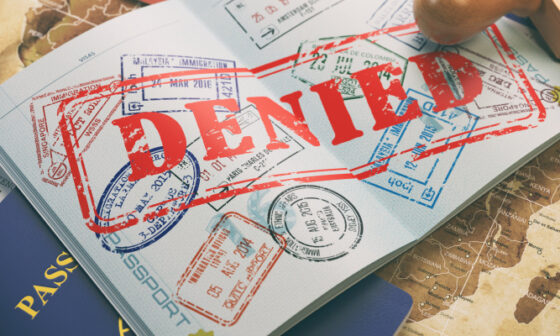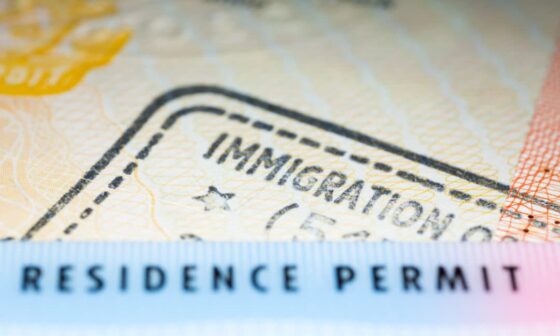I recall how anxious my cousin was when he was asked to undergo a DNA test as part of his immigration procedure. For many Nigerians, the prospect of taking a DNA test for immigration purposes is scary and fraught with uncertainty. Let’s look at the costs, methods, and legal ramifications of DNA testing in immigration proceedings, to provide clarity and direction to those who must comply.
What is a DNA Test for Immigration?
A DNA test for immigration is performed to confirm the biological ties between family members. This test is frequently used when documentary evidence of the relationship is weak or unavailable. For example, when parents sponsor their children for immigration, the authorities may request a DNA test to confirm the biological relationship.
Can Immigration Ask for a DNA Test?

Yes, immigration authorities can seek a DNA test if they need to confirm a biological relationship that is not adequately documented. This request is frequently made when there are anomalies in the information provided, documents are missing, or the documents appear to be false. For example, if birth documents appear to have been tampered with or there is insufficient evidence to confirm a child’s relationship with a claimed parent, a DNA test may be required to offer definitive evidence.
In my experience, a family member had to take a DNA test when applying for a family-based visa due to irregularities in the birth documents they supplied. The DNA test produced sufficient proof to proceed with the application.
Why is DNA Testing Required for Immigration?
DNA testing is required for:
- Prevent Fraud: Verify if the familial links asserted are genuine. This helps to reduce fraudulent activity and ensure that immigration benefits are only granted to eligible individuals.
- Verify Documentation: Check the validity of birth certificates, marriage certificates, and other documentation. In many circumstances, documentation from specific countries is impossible to verify, so DNA testing is a reliable way.
- Ensure Compliance: Meet the legal requirements for specific visa types. To prevent immigration abuse, some visa categories explicitly require proof of biological connections.
Who Might Need a DNA Test for Immigration or Passport Applications?

DNA testing for immigration and passport applications is often required when biological ties must be established but cannot be confirmed using available paperwork. Here are some frequent instances in which DNA tests may be required:
#1. Family Reunification Visas
Family reunification visas frequently demand confirmation of biological connections. If documentation such as birth or marriage certificates is missing, damaged, or deemed insufficient, a DNA test can give the proof.
If there are differences in the paperwork presented, a Nigerian woman asking for a visa to accompany her kid to the United States may be required to take a DNA test to confirm their biological kinship.
#2. Adopted Children
When adoptive parents file for immigration benefits for their adopted children, a DNA test may be required to confirm the relationship, particularly if the destination country does not accept the adoption documents.
Example: A Nigerian couple who have adopted a kid may be required to produce a DNA test to confirm the child’s relationship to them when applying for the child’s visa to go to the UK.
Advertisements
#3. Missing or incomplete birth records
Many people in nations with inadequate record-keeping may lack complete or accurate birth records. In such instances, DNA testing becomes a reliable way to establish familial relationships.
Example: In rural Nigeria, birth records may be incomplete or unavailable. To apply for a family-based visa to Canada, a DNA test may be required to verify familial relations.
#4. Fraud Prevention
Immigration officers may seek DNA samples to avoid false applications. This guarantees that those asking for visas or passports are truly related, as indicated.
A Nigerian family asking for immigration to Australia may be compelled to take a DNA test to prevent bogus claims of family ties.
#5. Citizenship Applications
Certain countries may require DNA testing as part of the citizenship application process, especially if there are concerns about the legitimacy of the documents submitted.
A Nigerian-born person requesting citizenship in the European Union may be required to present DNA evidence to prove their family heritage.
Advertisements
#6. International Adoptions
When adopting a child overseas, the adoptive parents may be required to undergo DNA testing to establish the child’s identity and relationship, ensuring that the adoption is lawful in both the home and destination countries.
Nigerian parents adopting a kid from another country may be required to produce DNA test results to immigration authorities when applying for the child’s Nigerian passport.
Cost of DNA Testing for Immigration

The cost of DNA testing might vary significantly depending on the country and testing institution. In Nigeria, the average cost is between ₦150,000 and ₦300,000 per person. The fees cover the collecting, analysis, and reporting of DNA samples.
According to the US Embassy in Nigeria, DNA testing is often required for family-based immigration petitions.
Procedures for DNA Testing
The technique for DNA testing includes numerous steps:
- Appointment Schedule: Schedule an appointment with an approved DNA testing center. It is critical to guarantee that the destination country’s immigration officials recognize the testing center.
There are multiple recognized labs in Lagos, and appointments are usually available within a week. - Sample Collection: On the appointment day, a buccal swab (cheek swab) is taken from the inside of the mouth. This treatment is painless and only takes a few minutes.
- Laboratory Analysis: The gathered samples are forwarded to a laboratory for testing. The lab compares the DNA profiles of the persons involved to determine the possibility of a biological relationship. The analysis typically looks for a match in DNA markers and has a 99.99% accuracy rate for verifying relationships.
- Result Reporting: After the analysis is completed, the results are transmitted directly to the immigration authorities and the applicants. This ensures the confidentiality and security of the information.
In my cousin’s situation, the results arrived at the US Consulate within four weeks, allowing the visa application procedure to move smoothly.
During my cousin’s immigration process, a DNA sample was collected at a certified lab in Lagos, and the findings were delivered to the US Consulate within four weeks. This stage was critical in verifying the family link, which ultimately aided in obtaining the visa.
By understanding the procedures, prices, and justifications for DNA testing in immigration, candidates can better prepare for this component of the visa application process. Proper planning and understanding can help reduce the stress associated with this requirement and provide a more seamless application experience.
Legal Implications of DNA Testing

DNA testing has various key legal ramifications in the context of immigration.
Accuracy and reliability
DNA testing is extremely accurate, with a 99.99% chance of verifying biological ties. This high level of dependability makes DNA evidence an effective weapon in immigration disputes. For example, if there is any dispute about the legitimacy of birth certificates or other documentation, DNA testing can provide definitive proof of a family tie.
According to the International Journal of Law and Policy Review, DNA testing in immigration has a success rate of 98-99% in determining familial links.
Confidentiality
DNA testing centers are subject to strict confidentiality standards. The results are only shared with authorized parties, protecting the privacy of those participating. This means that only immigration officials and those being tested will have access to the results. Maintaining anonymity is critical to protecting applicants’ privacy rights.
Legal Binding
The results of DNA tests are legally binding in immigration proceedings. Positive results can lead to visa approvals, which affirm the applicant’s eligibility based on familial links. In contrast, bad results may result in the denial of the visa application. Because DNA test results are binding, they have a substantial impact on immigration authorities’ decision-making processes.
If a DNA test proves the biological tie between a parent and kid, it can be used as indisputable evidence in a family-based immigration application, resulting in visa approval.
How Long Does DNA Testing Take?
The complete DNA testing process, from sample collection to result reporting, usually takes four to six weeks. This timeframe contains:
- Appointment Scheduling: Choosing a date for sample collection at an accredited testing facility.
- Sample Collection: Obtaining DNA samples from the interior of the mouth, typically using a buccal swab.
- Laboratory examination: Samples are sent to a laboratory for examination, which involves comparing DNA profiles.
- Results Reporting: Compiling and communicating the results to immigration officials and applicants.
Can I Select Any DNA Testing Centre?
No, you must choose a DNA testing center that has been accredited by the destination country’s immigration authorities. Using an unrecognized facility may cause delays or rejection of your test results. To avoid problems, the testing center must meet the precise norms and procedures established by immigration authorities.
The United States Embassy in Nigeria certifies selected laboratories for visa-related DNA testing. Using a non-accredited lab may render your test findings invalid.
What Happens If the DNA Test Returns Negative?
If the DNA test does not confirm the stated link, the visa application will likely be denied. Immigration officials rely on DNA test results as definitive confirmation of familial relationships. Here’s what you need to do:
Provide Accurate Details
Ensure that all of the information in your application is correct and truthful. Misrepresentation can result in serious penalties, including visa refusal and possibly prohibitions on future applications.
Be ready for the outcome
Understand that a negative result indicates that the stated relationship does not exist, based on the DNA evidence. It is critical to plan for this possibility and meet with an immigration lawyer to discuss other options or future steps.
Consult an Immigration Lawyer
If your visa application is denied owing to a negative DNA test result, speaking with an immigration lawyer can be beneficial. They can advise you on alternative choices such as reapplying with extra supporting evidence or looking into other immigration categories that may be open to you.
Appeal Procedure
If you believe the DNA test findings were incorrect or there were other problems in the processing of your application, you may be able to file an appeal. An immigration lawyer can guide you through this procedure and advise you on the best course of action.
Template to Prepare for DNA Testing
Here’s a basic template that will help you prepare for a DNA test for immigration purposes.
DNA Testing Preparation Template
Key Takeaways
- In immigration proceedings, DNA tests are frequently necessary to verify biological connections.
- DNA testing in Nigeria costs between ₦150,000 and ₦300,000 per person.
- DNA testing processes include scheduling, sample collection, laboratory analysis, and result reporting.
- DNA test findings are legally binding and very accurate, with a 99.99% chance of confirming relationships.
- It is critical to select a certified testing center and supply the required papers to ensure a smooth process.
Conclusion
Understanding the expenses, methods, and legal consequences of DNA testing for immigration might help reduce the stress of the process. Always ensure that you are well-prepared and informed to effectively handle this need. Do you have any experience with DNA testing for immigration? What were the obstacles and results? Please share your experiences and insights here.
Related Articles
- Can Immigration See Expunged Records? Expert Insights on Immigration Background Checks
- Can Immigration Sponsorship Be Revoked? What Immigrants and Sponsors Need to Know
- Can Immigration Stop You at an Airport? A Guide for International Travelers
- Canadian Immigration: How to Japa From Naija to Canada
- How to Make the Immigration Health Surcharge Work for You: Detailed Guide
References
Advertisements






